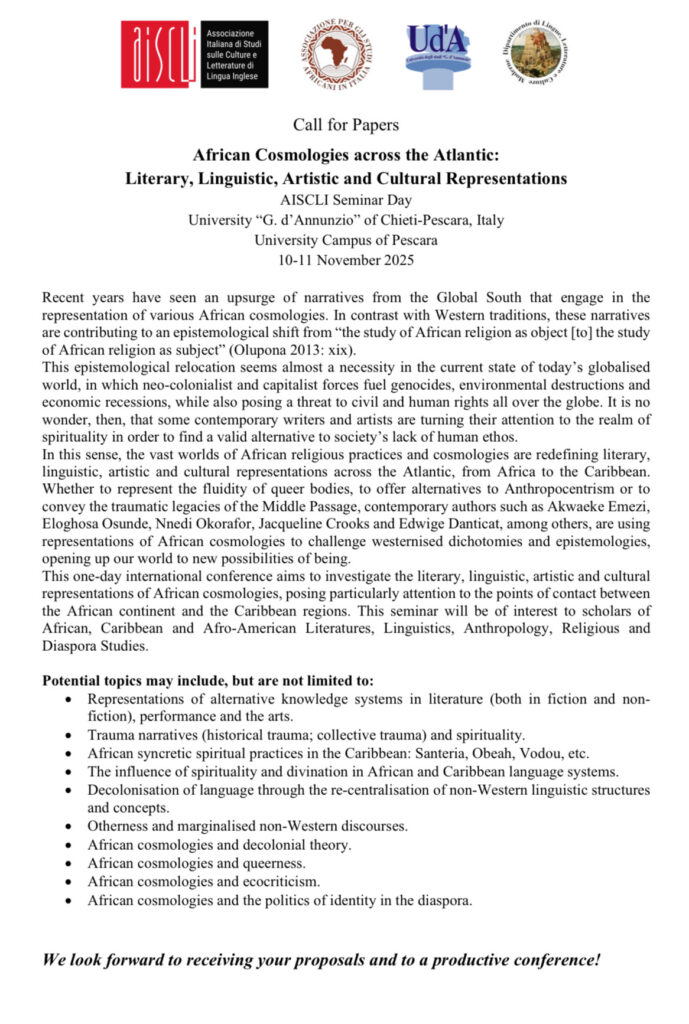Naples, 23–25 October 2025Università di Napoli “L’Orientale” The international conference Echoes of Hate, Screens of Resistance marks the culmination of the PRIN 2022 project ECHOES – English Studies to Contrast Hate Online and Enhance Solidarity, a multidisciplinary initiative funded by the Italian Ministry of University and Research. The project focuses on the critical analysis of harmful online practices (HOPs) in English multimodal discourse, with an emphasis on promoting solidarity, inclusion, and responsible digital citizenship. In today’s increasingly polarised digital world, hate is no longer confined to fringe communities; in fact, it circulates widely through social media, public discourse, and popular audiovisual culture. Cinema and television, together with social networking systems, participate in both the reproduction and the contestation of exclusionary narratives. Meanwhile, educational institutions face mounting pressure to equip learners and educators with tools to identify, counter, and neutralise these forms of hate. This conference provides an open platform for scholars, educators, cultural practitioners, media analysts, and digital activists to reflect on the critical role of language, screen discourse, and pedagogical practices in addressing hate and fostering inclusive futures. Over the past two years, the ECHOES project has investigated online hate from a multimodal critical discourse analysis (MCDA) perspective, analysing verbal, visual, and aural digital texts in English. Using this methodology, the interuniversity research team has identified four prominent forms of HOPs, namely trolling, cyberbullying, bashing, and defamation, and analysed their impact on four particularly vulnerable social groups: women, migrants and diasporic communities, LGBTIQ+ individuals, and people with disabilities. In addition, the analysis was guided by six main hate categories: Age (including discrimination against the elderly), Body, Disability, Ethnicity (including various forms of racism not necessarily linked to migration), Gender, and Religion.The conference will explore how digital and screen-based textualities construct and circulate hate, and how they offer discursive and pedagogical opportunities for resistance. By convening experts from fields such as applied linguistics, discourse analysis, media and film studies, education, and social semiotics, Echoes of Hate, Screens of Resistance seeks to cultivate and promote interdisciplinary dialogue and reinforce the role of education and research in countering digital toxicity. We especially encourage contributions that engage critically with the idea of digital solidarity, interrogate the ethical responsibilities of content creators and educators, and propose tangible models for promoting inclusion and mutual respect in online and audiovisual communication. Conference ThemesWe welcome proposals for individual papers, panels, and workshops on topics including, but not limited to: 1. Digital Hate Discourse• Multimodal analysis of online hate speech (HOPs) across social media platforms• Discursive strategies of exclusion and vilification in English-language digital environments• Affect, irony, humour, and other indirect forms of digital aggression and disambiguation• Corpus-informed approaches to the study of online hostility 2. Cinema and Television as Arenas of Resistance• Audiovisual representations of vulnerable communities (LGBTIQ+, migrants, women, disabled people)• Screen narratives that challenge hate and promote empathy• Subtitling, dubbing, and the translation of discriminatory ideologies• Censorship, genre, and ideology in TV and film discourse 3. Activism, Policy, and Civil Society• Best practices in hate monitoring, moderation, and civic advocacy• Pedagogies of peace and solidarity across sectors• Partnerships between researchers and public institutions• Lifelong learning and critical media literacy in local communities 4. Teacher Training Track• As part of the ECHOES project’s commitment to outreach and societal impact, the Conference will feature a dedicated Teacher Training Track on Saturday, 25th. This track will include 45-minute workshops and/or materials presentations specifically designed to support English language teachers. Aimed particularly at those working in primary and secondary education, it will offer practical insights into teaching digital literacy, global citizenship, and intercultural communication through inclusive and critical methodologies. Submission Guidelines• Abstracts (max 300 words, including references) for individual 20-minute papers must be submitted via email in English, accompanied by a brief bio (maximum 150 words).• Panel proposals (3-4 speakers) should include a panel rationale (max 300 words, including references) and individual abstracts (max 200 words each, without references). Write to: prin2022echoes@unior.it Deadline for submissions: 30th July 2025Notification of acceptance: 1st Sept. 2025Registration deadline: 30th Sept. 2025Language: English Keynote SpeakersWe are delighted to announce the participation of internationally prominent scholars:• Salvatore Attardo (Texas A&M University)• Michael Burke (Utrecht University)• Giuditta Caliendo (Université de Lille)• Majid KhosraviNik (Newcastle University) TBC• Tiziana Terranova (University of Naples L’Orientale)• Mikael Toulza (Université de Lille) Convenor:Giuseppe Balirano, University of Naples L’Orientale Scientific Committee:Maria Cristina Aiezza (University of Naples L’Orientale), Emilio Amideo (University of Naples “Parthenope”), Marta Arcovito (University of Messina), Maria Vita Cambria (University of Messina), Maria De Santo (University of Naples L’Orientale), Bianca Del Villano (University of Naples L’Orientale), Alessandra Ferlito (University of Campania Luigi Vanvitelli), Antonio Fruttaldo (Sannio University), Bronwen Hughes (University of Naples “Parthenope”), Francesco Nacchia (University of Naples L’Orientale), Marina Niceforo (University of Naples L’Orientale), Maria Cristina Nisco (University of Naples “Parthenope”), Raffaele Pizzo (University of Naples L’Orientale), Annalisa Raffone (Pegaso University), Margherita Rasulo (University of Campania Luigi Vanvitelli), Katherine Elizabeth Russo (University of Naples L’Orientale), Maria Grazia Sindoni (University of Messina), Stefania Taviano (University of Messina). Organising Committee:Mauro Brondi, Maria De Santo, Robin Donadio, Roberto Esposito, Dalia Mennella, Francesco Nacchia, Marina Niceforo, Raffaele Pizzo Venue:23–24 October 2025:San Severo al Pendino Heritage Site, The Historic SacristyVia Duomo, 286 – 80138 Naples 25 October 2025:Istituto Italiano per gli Studi Filosofici, Palazzo Serra di Cassano Via Monte di Dio, 14-15 – 80132 Naples

